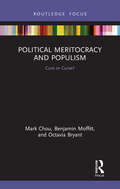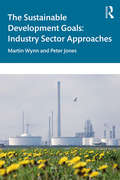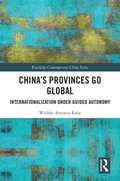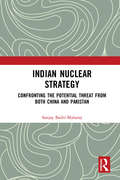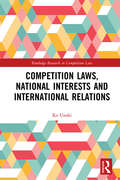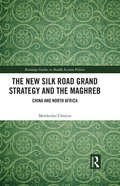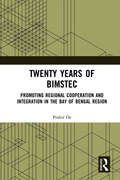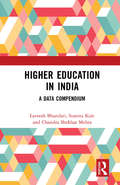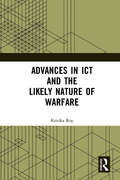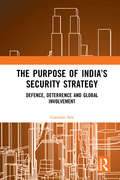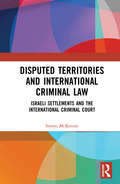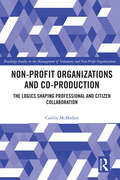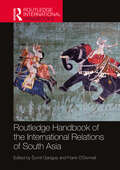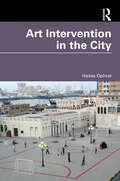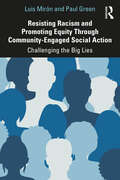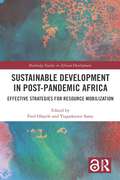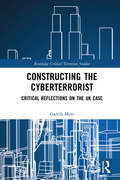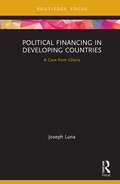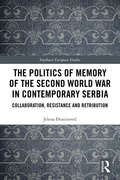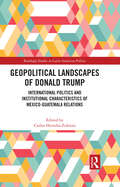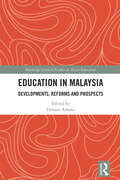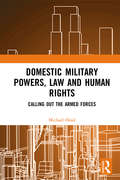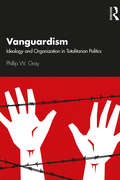- Table View
- List View
The Theatrical Professoriate: Contemporary Higher Education and Its Academic Dramas
by Emily RoxworthyThis book argues that today’s professoriate has become increasingly theatrical, largely as a result of neoliberal policies in higher education, but also in response to an anti-intellectual scrutiny that has become pervasive throughout the Western world. The Theatrical Professoriate: Contemporary Higher Education and Its Academic Dramas examines how the Western professoriate increasingly finds itself enacting command performances that utilize scripting, characterization, surrogation, and spectacle—the hallmarks of theatricality—toward neoliberal ends. Roxworthy explores how the theatrical nature of today’s professoriate and the resultant glut of performances about academia on stage and screen have contributed to a highly ambivalent public fascination with academia. She further documents the "theatrical turn" witnessed in American higher education, as academic institutions use performance to intervene in the diversity issues and disciplinary disparities fueled by neoliberalism. By analyzing academic dramas and their audience reception alongside theoretical approaches, the author reveals how contemporary academia drives the professoriate to perform in what seem like increasingly artificial ways. Ideal for practitioners and students of education, ethnic, and science studies, The Theatrical Professoriate deftly intervenes in Performance Studies’ still-unsettled debates over the differential impact of live versus mediated performances.
Political Meritocracy and Populism: Cure or Curse? (Routledge Studies in Anti-Politics and Democratic Crisis)
by Benjamin Moffitt Mark Chou Octavia BryantOffering the first in-depth analysis of the relationship between populism and political meritocracy, this book asks why states with meritocratic systems such as Singapore and China have not faced the populist challenge to the extent that liberal democratic states have. Is political meritocracy immune to populism? Or does it fan its flames? Exploring this puzzle, the authors argue that political meritocracies are simultaneously immune and susceptible to populism. The book maintains that political meritocracy’s focus on the intellect, social skills, and most importantly virtue of political leaders can reduce the likelihood of populist actors rising to power; that meritocracy’s promise of upward mobility for the masses can work against elitism; and that rule by the ‘meritorious’ can help avoid crises, diminishing the political opening for populism. However, it also shows that meritocracy does little to eliminate grievances around political, cultural, and social inequality, instead entrenching a hierarchy – an allegedly ‘just’ one. The book ultimately argues that the more established the system of political meritocracy becomes, the more it opens the door to populist resentment and revolt. Pitched primarily to scholars and postgraduate students in political theory, comparative politics, Asian studies, and political sociology, this book fills an important scholarly gap.
The Sustainable Development Goals: Industry Sector Approaches
by Martin Wynn Peter JonesIn 2015, the United Nations launched the Sustainable Development Goals (SDGs) to define and coordinate global priorities and aspirations up to 2030 in response to the economic, social and environmental challenges faced by the planet. Many governments across the world signed up to these goals. United Nations Secretary-General Ban Ki-Moon noted at the outset that business would be a vital partner in achieving the SDGs. This easy-to-digest book provides a critical evaluation of how a range of multinational companies from across different commercial sectors are currently addressing the SDGs and the challenges they are facing in contributing to them. The private sector has thus been set the challenge of responding positively in support of the SDGs whilst at the same time acting in the shorter-term interests of its stakeholders. Using a wealth of illustrative materials drawn from company reports and other sources, this book looks at the response of 80 companies and organisations from eight different industry sectors. It examines the different approaches taken, discusses how far the SDGs are actively supported and reviews how progress is being assessed against related targets and objectives. In addition to an analysis of each industry sector, the book provides a summary overview of all industry sectors studied, identifying the most and least supported SDGs overall. This book will be of interest to the fast-growing body of academics studying and researching sustainability, as well as to industry managers and public-sector operators involved in sustainability management and reporting. It provides detailed commentary and insights, and identifies both key themes from the research and critical issues for the successful implementation of the SDGs in the period up to 2030.
China’s Provinces Go Global: Internationalization Under Guided Autonomy (Routledge Contemporary China Series)
by Wiebke Antonia RabeThis book provides novel insights into how Chinese provinces have developed into major sources of China’s outbound investments. Focusing on the Yangtze River Delta region, the book compares two provinces with highest outbound investment in China, Jiangsu and Zhejiang and traces how locality-unique conditions contribute to the economic internationalization of Chinese provinces. Through its in-depth exploration of these case studies, the book reveals how the deficiency of enterprises’ investment capacity heavily depends on the unique political, economic, formal and informal institutions of each province. The findings presented in this book also offer conclusions relevant to the study of the internationalization process of emerging economies engaging in outward investment, such as India and Brazil. Featuring insights from interviews with scholars, managers and government officials this will be an invaluable resource for scholars, students and professionals interested in International Economics, International Political Economy, Chinese Studies and Asian Studies.
Indian Nuclear Strategy: Confronting the Potential Threat from both China and Pakistan
by Sanjay Badri-MaharajThis book examines India’s nuclear strategy as it confronts the potential threat from both China and Pakistan. The potential threats - traditional as well as non-traditional CBRN threats - will be examined as will India’s approach to dealing with them. India’s nuclear arsenal, its dual purpose civil-military space program and its nascent BMD capability will be explored with a view to informing the reader as to the steps taken by India to confront its nuclear challenges. Please note: Taylor & Francis does not sell or distribute the Hardback in India, Pakistan, Nepal, Bhutan, Bangladesh and Sri Lanka
Competition Laws, National Interests and International Relations (Routledge Research in Competition Law)
by Ko UnokiMost of the competition laws currently enforced by states aim to protect consumer welfare and promote fair competition by regulating against anti-competitive behavior. Yet, despite the shared objectives, the global community does not have a common global competition law. In exploring the reasons for this, this book takes a unique interdisciplinary approach by using international relations theories to illustrate the relationship between the enforcement of competition laws and international relations through an analysis of competition cases relating to cartels, extraterritoriality, and corporate mergers and acquisitions. Through an examination of this relationship, this book will argue on why the views held by state leaders on the condition of international relations may at times lead them to either arbitrarily over-enforce or disregard their competition laws to the detriment of fair competition and consumer welfare. This book also provides suggestions for global business investors who face competition law issues on how they may accommodate such views.
The New Silk Road Grand Strategy and the Maghreb: China and North Africa (Routledge Studies in Middle Eastern Politics)
by Mordechai ChazizaExamining Chinese-North African relations through the lens of President Xi Jinping’s Silk Road grand strategy, this book offers a comprehensive analysis of emerging strategic and economic partnerships in the Maghreb region. China’s ‘Belt and Road Initiative’ (BRI) is one of the most ambitious infrastructure projects in modern history. This book argues that the BRI framework is vital in understanding the shifting balance of power within the Maghreb region and between the North African countries, the EU, the US, and China. It is argued that an increasing interdependence can be observed between China and the Maghreb in energy, construction, infrastructure building, political ties, trade and investments, financial integration, people-to-people bonds, and defence. The author reveals the complexities and challenges of Beijing's BRI, exploring how this synergy will shape the Maghreb in the future. Additionally, the book argues that the balance of global politics will be critically affected by these emerging partnerships. The book will be of particular interest to students and academics focused on interstate dynamics and foreign policy in the West Asia and North Africa (WANA) region, but in its global ramifications the book is also much-needed reading for those working in International Relations, Politics and Economics, and Public Policy.
Twenty Years of BIMSTEC: Promoting Regional Cooperation and Integration in the Bay of Bengal Region
by Prabir DeThis book reviews the past and provides new strategies to help BIMSTEC achieving a new paradigm of integration. It primarily deals with the regional cooperation and integration issues, and assesses policy priorities, effectiveness, implementation imperatives and challenges. Each chapter in this book tries to capture essential features of the crosscutting issues and attempts to draw some policy implications. The subject of this book will be of special interests to policy planners, development organisations, academicians, researchers as well as potential investors. Please note: T&Fdoes not sell or distribute the Hardback in India, Pakistan, Nepal, Bhutan, Bangladesh and Sri Lanka.
Higher Education in India: A Data Compendium
by Laveesh Bhandari Sumita Kale Chandra Shekhar Mehra Priyanka Dutta Shreekanth MahendiranThis volume puts together the latest available information on higher education in India at a single location. While higher education is an extremely dynamic segment in India’s education sector, yet a host of issues related to a lack of a good and comprehensive monitoring system have prevented the regular publishing of data on this sector. Data does exist, but it tends to be infrequently published, dated, not comparable and many times of poor quality. The authors present here the most appropriate data that is credible, from government or associated data sources. This compendium of data simplifies for the reader, the gamut of issues that must be kept in mind, before interpreting the data on higher education. This book will be of immense use and interest to educationists, policy-makers and student of varied disciplines including economics and demographics. Please note: Taylor & Francis does not sell or distribute the Hardback in India, Pakistan, Nepal, Bhutan, Bangladesh and Sri Lanka
Advances in ICT and the Likely Nature of Warfare
by Kritika RoyThis book focuses on how advances in ICT have brought about a sea change in the way people work, live and share while also making them vulnerable. These advances exhibit a fundamentally reformed global context for development that has not just been restricted to the civilian domain but has simultaneously impacted the military domain. The exponential pace of advances in the field of Artificial Intelligence (AI), robotics, big data, quantum computing or IoT (Internet of Things) pioneers a significantly different vision of work and society. The current trends in warfighting present a very blurred picture of the future operating environment, but they give some shape to its likely direction. Military forces are trying to become much more flexible and have been adapting to these changes while emphasizing the importance of innovation and improvisation in order to counter challenges emanating from future scenarios. In this context, the book highlights the changing military strategies and tactics across nations vis-à-vis the hanging and emerging ICT technologies. It also highlights the importance of looking at present institutions, legal frameworks and principles as well as at the restraining factors inherent in realpolitik in order to understand if nation states are ready. Please note: Taylor & Francis does not sell or distribute the Hardback in India, Pakistan, Nepal, Bhutan, Bangladesh and Sri Lanka
The Purpose of India’s Security Strategy: Defence, Deterrence and Global Involvement
by Gautam SenThis book comprises the journey of the Indian nation state and its tryst with destiny, where successive political leaderships, while governing India, contributed to a better understanding of the idea of India, its political and strategic culture, and the role that its military has had to play to develop that culture. Hence, the journey has been from the backwaters of ‘defensive defence’ to create a credible deterrence capacity as well as a doctrine to implement the same through political will and enter the domain of global involvement in the strategic, non-strategic as well as non-traditional areas of security. Thus, the title of the book The Purpose of India’s Security Strategy: Defence, Deterrence and Global Involvement. It is hoped that this book will serve as a referral document to understand the polemics of the development of a strategic culture in India for an era which will be dominated by the information age and artificial intelligence, without forgetting that the Indian political leadership has come of age to understand the role of the military in the process of nation building.
Disputed Territories and International Criminal Law: Israeli Settlements and the International Criminal Court
by Simon McKenzieIt has been over 50 years since the beginning of the Israeli occupation of the Palestinian Territories. It is estimated that there are over 600,000 Israeli settlers living in the West Bank and East Jerusalem, and they are supported, protected, and maintained by the Israeli state. This book discusses whether international criminal law could apply to those responsible for allowing and promoting this growth, and examines what this application would reveal about the operation of international criminal law. It provides a comprehensive analysis of how the Rome Statute of the International Criminal Court could apply to the settlements in the West Bank through a close examination of the potential operation of two relevant Statute crimes: first, the war crime of transfer of population; and second, the war crime of unlawful appropriation of property. It also addresses the threshold question of whether the law of occupation applies to the West Bank, and how the principles of individual criminal responsibility might operate in this context. It explores the relevance and coherence of the legal arguments relied on by Israel in defence of the legality of the settlements and considers how these arguments might apply in the context of the Rome Statute. The work also has wider aims, raising questions about the Rome Statute’s capacity to meet its aim of establishing a coherent and legally effective system of international criminal justice.
Non-profit Organizations and Co-production: The Logics Shaping Professional and Citizen Collaboration (Routledge Studies in the Management of Voluntary and Non-Profit Organizations)
by Caitlin McMullinNon-profit Organizations and Co-production:The Logics Shaping Professional and Citizen Collaboration develops a novel framework for analyzing the practices of co-production between citizens and professionals in the non-profit sector. Analysing organizations in three contexts (Sheffield, England; Lyon, France; and Montreal, Quebec, Canada), the book examines the international differences between non-profits, evidenced by the way that they variously blend or assimilate the logics of the market, state and community, and how this shapes the motivations for and approaches to co-production at the micro level in each context. This book presents a major step forward in comparative non-profit studies and the co-production of public services. This book will be of interest to researchers, policymakers, practitioners, and graduate/ postgraduate students in public administration and management, particularly within Public & Nonprofit Management and Organization Studies. The book speaks directly to key contemporary debates in these fields, including the nature of organizational hybridity, public service innovation and approaches to service user involvement.
Routledge Handbook of the International Relations of South Asia
by Šumit Ganguly Frank O’DonnellThis handbook offers a comprehensive overview of the international relations of South Asia. South Asia as a region is increasingly assuming greater significance in global politics for a host of compelling reasons. This volume offers the most comprehensive collection of perspectives on the international politics of South Asia, and it it covers an extensive range of issues spanning from inter-state wars to migration in the region. Each contribution provides a careful discussion of the four major theoretical approaches to the study of international politics: Realism, Constructivism, Liberalism, and Critical Theory. In turn, the chapters discuss the relevance of each approach to the issue area addressed in the book. The volume offers coverage of the key issues under four thematic sections: - Theoretical Approaches to the Study of the International Relations of South Asia - Traditional and Emerging Security Issues in South Asia - The International Relations of South Asia - Cross-cutting Regional Issues Further, every effort has been made in the chapters to discuss the origins, evolution and future direction of each issue. This book will be of much interest to students of South Asian politics, human security, regional security, and International Relations in general.
Art Intervention in the City
by Hadas OphratThis book focuses on the phenomenon of art intervention—an expression of local initiatives by artists, collectives, and art centers wishing to influence the design of the space or make a change in its lifestyle. It pertains not only to acts of protest, but also to the creation of a new civil and political situation in which artists acknowledge their ability to constitute foci of power. These are reflected in acts such as squatting in abandoned buildings, restoring and redistributing them according to principles of social justice; mapping the city based on alternative parameters, such as revealing venues of collective memory or exposing the city's backyard; creating outdoor urban art galleries; and creating temporary architecture and alternative solutions in order to deal with the challenges we face in times of epidemic and environmental crisis. The art intervention phenomenon has intensified since the mid-1990s, so much so that even local authorities the world over have begun to adopt activist and artistic practices. Due to the intensive urbanization processes and current global threats, the creative trends and means surveyed in the book are crucial. This book will interest researchers, planners, urban planners, architects, social activists, local authority executives, art centers, artists, and designers.
Resisting Racism and Promoting Equity Through Community-Engaged Social Action: Challenging the Big Lies
by Luis Mirón Paul GreenThis book challenges pre-service and in-service educators to reflect critically on their assumptions and engage in praxis promoting racial and social equity. Grounded in policy contexts, historical understandings, and critical theories, this book describes innovative community-engaged approaches to resisting racism and promoting equity and features reflections and personal narratives from partners in change—including on-the-ground activists, voices from younger and older generations, educators, and first-time writers. Fueled by the ideology of white supremacy for over four centuries that whites matter more than Blacks, the authors argue that racial inequities exacerbated during the Trump administration and the legacy of neo-liberal policies dating to the "New Federalism" fiercely necessitate invoking community-engaged strategies to advance equity. This book advocates for collaboration among schools, community organizations, businesses, university centers, and community activists to address historically pressing issues, including systemic racism, declining educational opportunities, limited access to ongoing health care, and the decline of civility in public life.
Sustainable Development in Post-Pandemic Africa: Effective Strategies for Resource Mobilization (Routledge Studies in African Development)
by Fred OlayeleWith both domestic and external financing expected to dry up in the wake of the COVID-19 pandemic, this book argues that there is a need for fresh ideas and new strategies for achieving sustainable development in Africa. In addition to triggering the most severe recession in nearly a century, the COVID-19 pandemic has disrupted global value chains, causing unprecedented damage to healthcare systems, economies, and well-being, hitting the world’s most vulnerable people the hardest. Even before the pandemic, Africa was suffering from the effects of low commodity prices, sluggish GDP growth, high debt levels, low levels of domestic savings, and weak private capital inflows. This book argues that now, as the continent emerges from the current crisis, it will be important to reconfigure current financing sources under a forward-looking framework that incorporates other non-traditional financing tools and mechanisms such as public-private partnerships, sovereign wealth funds, gender lens investing, new growth drivers, and emerging and disruptive technologies. Finally, the book concludes by adopting a sectoral approach and examining the real economy impacts of new growth drivers such as agriculture value chains, industrialization, tourism, and the blue economy. Drawing on a range of original research as well as insights from practice, this book will be a useful guide for Global Development and African Studies researchers, as well as for policy makers, investors, finance specialists, and global business practitioners and entrepreneurs.
Pandemic Response and the Cost of Lockdowns: Global Debates from Humanities and Social Sciences (The Politics of Pandemics)
by Peter Sutoris Sinéad Murphy Aleida Mendes Borges Yossi NehushtanPandemic Response and the Cost of Lockdowns brings the vast analytical apparatus of the humanities and social sciences to the task of critically analysing the political decisions taken in 2020–21. The global response to the COVID-19 pandemic left little time for critical debate about the impact of lockdowns. Across the world, governments claimed to "follow the science", but they rarely paid attention to the humanities and social sciences. Indeed, the absence of these perspectives is symptomatic of a longer-term trend in the marginalisation of the humanities and social sciences in policymaking and public debate. This book exposes the tragic consequences of this omission in 2020–21 and demonstrates the potential for a different path in the future – a path in which we pay attention to power, complexity, and our biases. The authors establish what these disciplines have to offer in a global emergency and how we can ensure they help us avoid the mistakes of 2020–21 in the future. This original and interdisciplinary book will be of great interest to students, scholars, and researchers throughout the humanities and social sciences, including the fields of philosophy, sociology, anthropology, law, political science, and history, as well as relevant policymakers.
Constructing the Cyberterrorist: Critical Reflections on the UK Case (Routledge Critical Terrorism Studies)
by Gareth MottThis book maps and analyses the official British construction of the threat of cyberterrorism. By using interpretive discourse analysis, this book identifies ‘strands’ from a corpus of policy documents, statements, and speeches from UK Ministers, MPs, and Peers between 12 May 2010 and 24 June 2016. The book examines how the threat of cyberterrorism was constructed in the UK, and what this securitisation has made possible. The author makes novel contributions to the Copenhagen School’s ‘securitisation theory’ framework by outlining a ‘tiered’ rather than monolithic audience system; refining the ‘temporal’ and ‘spatial’ conditioning of a securitisation with reference to the distinctive characteristics of cyberterrorism; and, lastly, by detailing the way in which popular fiction can be ascribed agency to ‘fill in’ an absence of ‘cyberterrorism’ case studies. He also argues that the UK government’s classification of cyberterrorism as a ‘Tier One’ threat created a central strand upon which a discursive securitisation was established. This book will be of interest to students of Critical Security Studies, terrorism studies, UK politics, and international relations.
Political Financing in Developing Countries: A Case from Ghana (Routledge Explorations in Development Studies)
by Joseph LunaThis book argues that to fully grasp the decision-making of politicians and political actors in developing countries, we must first understand how politicians finance their campaigns for office—and to whom they are indebted and expected to repay. Political Financing in Developing Countries focuses on Ghana in depth, a country often held up as an example of a successful, two-party democracy with regular party changes in government. However, it is unlikely that candidates and political parties are wealthy enough to finance the increasing costs of campaigns and constituent demands, and successful democratic outcomes could be masking a system that actually hinders development progress. Drawing on nearly 200 interviews and extensive fieldwork, this book posits that political funds are extracted by an iron square of politicians, bureaucrats, construction contractors, and political-party chairs which rigs the procurement of local-development projects to generate kickbacks. The iron square remains robust across party changes in government due to reciprocity obligations that minimize contractors’ income risks. Ultimately, this web of kickbacks diminishes the quality of development by reducing the funds available for projects and distorting incentives to monitor projects. To break this iron square, the book recommends replacing sealed-bid procurement—a "best practice" that ignores on-the-ground realities—with a system that accounts for income stabilization and social obligations. Overall, the book argues that scholars of development should advance research on political finance to identify and then alleviate the games that decision makers must play to survive in the political sphere. Political Financing in Developing Countries will be an important and timely resource for scholars across development studies, politics, economics, and African Studies.
The Politics of Memory of the Second World War in Contemporary Serbia: Collaboration, Resistance and Retribution (Southeast European Studies)
by Jelena ĐureinovićExploring the concepts of collaboration, resistance, and postwar retribution and focusing on the Chetnik movement, this book analyses the politics of memory. Since the overthrow of Slobodan Milošević in 2000, memory politics in Serbia has undergone drastic changes in the way in which the Second World War and its aftermath is understood and interpreted. The glorification and romanticisation of the Yugoslav Army in the Homeland, more commonly referred to as the Chetnik movement, has become the central theme of Serbia’s memory politics during this period. The book traces their construction as a national antifascist movement equal to the communist-led Partisans and as victims of communism, showing the parallel justification and denial of their wartime activities of collaboration and mass atrocities. The multifaceted approach of this book combines a diachronic perspective that illuminates the continuities and ruptures of narratives, actors and practices, with in-depth analysis of contemporary Serbia, rooted in ethnographic fieldwork and exploring multiple levels of memory work and their interactions. It will appeal to students and academics working on contemporary history of the region, memory studies, sociology, public history, transitional justice, human rights and Southeast and East European Studies.
Geopolitical Landscapes of Donald Trump: International Politics and Institutional Characteristics of Mexico-Guatemala Relations (Routledge Studies in Latin American Politics)
by Carlos Heredia-ZubietaGeopolitical Landscapes of Donald Trump examines the role that local actors in Mexico, Central America and the United States have played in shaping the Mexico-Guatemala transborder region. From governments to business and organized crime, scholars from both Mexico and the United States introduce a sophisticated approach beyond diplomatic communiqués to tell the story of how Mexico became the wall that Donald Trump promised to build. This is a story of how governments defended their sovereignty in their discourse, only to pave the way for punitive policies that hurt their fellow citizens. The inequalities brought by the extractive economy, the homicides and displacement wrought by the systemic violence, the exodus pushed by environmental degradation and the political crisis generated by economic, political, and military elites need to be addressed to make the transborder region livable for its own population. Geopolitical Landscapes of Donald Trump will be of interest to scholars and students of international relations and Latin American Studies. It will also be of interest to policymakers, practitioners, and general readers who are following US-Mexico and US-Central America relations.
Education in Malaysia: Developments, Reforms and Prospects (Routledge Critical Studies in Asian Education)
by Donnie AdamsThis book examines Malaysia’s ambitious reform agenda and educational landscape, drawing upon the eleven key shifts in the Malaysia Education Blueprint 2013-2025. It provides a comprehensive plan for a rapid and sustainable transformation of the Malaysian education system, and what is needed in shaping the educational reforms in Malaysia, especially post-COVID, through to 2025. The contributors to this volume - scholars, researchers and practitioners who possess a deep and embedded understanding of Malaysian education - focus on the interplay of prevailing and persistent problems, and what is needed in shaping the educational reforms in Malaysia. As a critical assessment of the Malaysian Education Blueprint reform efforts and policies, this edited book will be of particular interest to educators, scholars, and policymakers on the latest trends and challenges in Malaysian education policy.
Domestic Military Powers, Law and Human Rights: Calling Out the Armed Forces
by Michael HeadThis book examines the national and international law, human rights and civil liberties issues involved in governments calling out the armed forces to deal with civil unrest or terrorism. The introduction of domestic military powers has become an international trend. Troops already have been seen on the streets in major Western democracies. These developments raise major political, constitutional and related problems. Examining the changes underway in eight comparable countries—the United States, Canada, Britain, France, Italy, Germany, Japan and Australia—this book provides a review and analysis of this trend, including its implications for legal and political rights. The book will be of interest to the general public, as well as students, academics and policy-makers in the areas of human rights and civil liberties, constitutional law, criminal justice and security studies.
Vanguardism: Ideology and Organization in Totalitarian Politics
by Phillip W. GrayProviding an innovative conceptualization to extremist political movements founded upon "world-historic" populations and vanguard party organizations, Vanguardism sets out a new path in investigating the intellectual and historical influences that created extremist politics, the totalitarian movements and regimes of the twentieth century, and a framework for interpreting extremism in the present. Expanding its view across the turbulent intellectual currents of the nineteenth century, Philip W. Gray illustrates how these ideas shaped the shared ideational and organizational structures that would develop into Leninism, Fascism, and Nazism in the early twentieth century. Moving beyond the Second World War, the book explicates how vanguardism did not vanish with the war’s conclusion, but was modified throughout the period of national liberation movements and Western extremist groups over the ensuing decades. Concluding in the present with an eye to the future, Gray presents a framework for comprehending the extremist movement of today, and how organizational shifts can give us clues to the forms of totalitarian politics of tomorrow. Original and provocative, Vanguardism will become essential reading for everyone looking to understand totalitarianism and extremist politics of our time.

